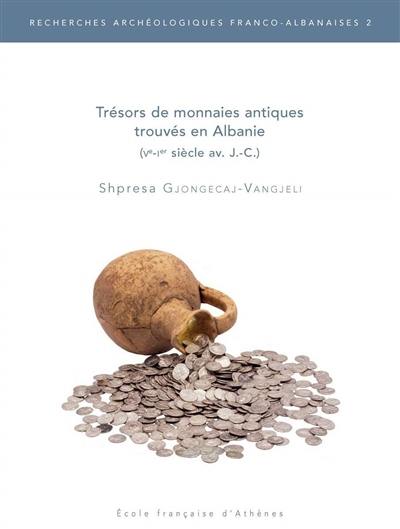
Fiche technique
Format : Broché
Nb de pages : 417 pages
Poids : 2010 g
Dimensions : 22cm X 28cm
ISBN : 978-2-86958-315-3
EAN : 9782869583153
Trésors de monnaies antiques trouvés en Albanie
Ve-Ier siècle av. J.-C.
Quatrième de couverture
L'Albanie, qui correspond à la partie sud de l'Illyrie antique, a fait connaître ces vingt- sept « trésors » de monnaies allant du milieu du Ve siècle av. J.-C. jusqu'au règne d'Auguste : le mot trésor renvoie aussi bien à une somme considérable gagnée à la guerre qu'au capital accumulé par un chef de guerre au long d'une carrière menée au-delà des mers, mais aussi à des sommes beaucoup plus faibles rassemblées pour servir à un projet qui ne se réalisera pas, ou à un ensemble de monnaies de bronze ayant perdu toute valeur à la suite d'un changement monétaire.
Les deux cités fondées par Corinthe, Apollonia et Dyrrachion (appelée aussi Épidamne), commencèrent à frapper monnaie au IVe siècle, mais cette forme de richesse avait déjà excité l'intérêt des Illyriens et la monnaie des deux cités s'impose très vite comme l'instrument financier de la région, utilisée aussi bien par les Illyriens que par les Grecs. L'Illyrie est un pays mal connu, dont les auteurs grecs et latins n'ont guère parlé qu'à l'occasion des guerres qui y attirèrent ses voisins de Grèce ou d'Italie. Les trésors sont pour l'historien moderne la meilleure source d'information sur l'histoire du pays, les grands évènements qui transformèrent la monnaie locale, y attirèrent devises et armées étrangères. C'est cette histoire que Shpresa Gjongecaj-Vangjeli reconstruit par ses trésors.
Albania, located in the southern part of ancient Illyria, is home to these twenty- seven « hoards » of coins dating from the middle of the fifth century BC to the reign of Augustus : the word hoard refers as much to a considerable sum won in war as to the capital accumulated by a warlord during campaigns overseas, but also to much smaller sums collected to fund a project that did not come to fruition, or a set of bronze coins that have lost their value following a currency change.
The two cities founded by Corinth, Apollonia and Dyrrachion (also called Epidamne), began to coin money in the fourth century, but this form of wealth had already come to the attention of the Illyrians and the currency of the two cities quickly established itself as the financial tool of the region, used by both the Illyrians and the Greeks.
Illyria is a little-known country, only mentioned by Greek and Latin authors in connection with the wars that involved its neighbours from Greece or Italy. For the modern historian, the hoards are the best source of information on the history of the country, and the great events which transformed the local currency, attracted foreign currencies and armies. It is this story that Shpresa Gjongecaj-Vangjeli reconstructed through these hoards.





